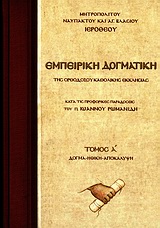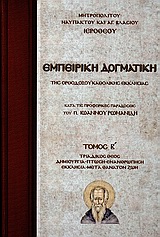1. Question: What
prompted you to compile the teaching of Fr. John Romanides,
which in essence is the official position of our Church?
Reply: The written
texts and the oral traditions of Fr. John Romanides have as
their core the dogmas of the Church, but, they are delivered
from within their basic prerequisite: experience. To the
many, dogmas are regarded as arbitrary axioms that have nothing
to do with life; the fact is, the dogmas of the Orthodox Church
are more reminiscent of medications that scientists have
discovered after many years of research and are offering for the healing of various morbid situations.
This is what prompted me to
embark on the "Empirical Dogmatics", based on the oral teachings
of Fr. John Romanides, which deal with the major existential and
ontological problems that torment mankind and which definitely
have social repercussions. They are questions such as:
"What is God? How can we
attain a personal communication with Him? What is Man?
What is the purpose of his existence? Why does death
exist? What is there after death? etc...
Fr. John
Romanides' teaching fully complies with this requirement.
A reader told me that this book can even make an atheist
appreciate the theology of the Orthodox Church, because it
expresses the depths of the dogma and moves beyond moralistic
conventionalities.
2.
Question: How difficult was this project, with regard to
selecting the most opportune points from out of the entire - and
admittedly vast - opus of his?
Reply:
The project that I had to compile was indeed a vast and
difficult one. I had around 1500 pages of transcripts
from taperecorded homilies of the spoken word of Fr. John and
I had to isolate the theological topics from among hundreds of
other topics - historical, scientific, etc. - because Fr. John
Romanides closely linked theology to History, but he also
interpreted it from within modern scientific discoveries and
therefore I had to locate all the purely theological segments.
But even
after this selection, I still had to connect the texts between
them into one unity, with a sequence in thought and with relevance.
It was like working on a jigsaw puzzle; like taking some
exquisite pieces out of an ancient amphora that was discovered
in an archaeological dig and presenting a completed piece of
work.
I undertook
this entire, laborious project with love and inspiration, and I
worked somewhat like an artist composing a painting. Thus,
even though the project was laborious, it was nevertheless also pleasant, inasmuch as
it brought surprise and enthusiasm, even to me. The word
"inspiration" says it all. After all, a Christian - as our
Fathers said - must work as an artist, as a poet...
3.
Question: Please describe some of your own experiences, from
within which the personality of that so significant theologian can be highlighted.
Reply:
Father John Romanides was a multi-talented personality. He
grew up in Manhattan of New York; he studied at the biggest
university centers of America (Yale, Harvard...); at Orthodox
Schools of Theology in America and Europe (Greek and Russian);
he was a professor of Dogmatics in America, in Thessaloniki and
Lebanon, and was very familiar with the western and the eastern
man. He could equally drive a plane and a boat,
and also be familiar with the achievements of modern science.
All the
same, even though I had been reading his works from the past, I
got to know him personally after his retirement from the
University of Thessaloniki, when he was living in Athens.
He had a good knowledge of many subjects: theological,
scientific, diplomatic, historical... and was continuously into
research. His mentality (and the art of a researcher) he had
learnt in America. And yet, he was simple, humble, calm,
but also concerned about the levels of our society and theology
in our land. He was an easterner who lived in the western
world; a visionary who lived in a society of many interests; an
ascetic who lived outside the Monastery, inside the modern
community. I don't wish to idealize him, but he really was
a noble and sensitive person.
Twenty days
before his passing, when I went to visit him at his home, I
discovered that he would wake up in the night and pray - just
like a monk - the way his mother did, whom he loved dearly; a
woman of the East, who lived the Cappadocian lifestyle inside
Manhattan, New York, and who finally became a nun at the
Monastery at Souroti near Thessaloniki and under the guidance of
the Elder Paisios, who greatly respected her.
4.
Question: Are there any "latent" or special points to look
out for while studying the books, that the reader has to
discover for himself?
Reply:
Every reader will be impressed, by various points of his
teaching. There certainly are one or two "latent" points
for the many, which do however express the depth of his
teaching. I have already submitted this question to many
readers of the books, to determine if they had located them, and
that is why I won't tell you which points they are.
What is
important though, is that Fr. John Romanides during the
turbulent course of his life had clashed with many theologians,
on account of the various changes that he encountered.
There were also many who did not comprehend his teaching. But,
because he had attained a personal certainty, he was absolute in
many topics and would express himself sententiously.
Nevertheless, his basic opus - if one examines it in depth - was
unifying, since it pinpointed the relationship between atheists
and Christians, Jews and Greeks, orthodox and heterodox,
Latin-speaking, Hellenic-speaking and Arab-speaking Romans.
He believed in Romanity - not as an ideology, but as a way of
life that constitutes a unifying force between seemingly
contrary situations. He was a noble, an easterner, deeply
democratic and at the same time a revolutionary. These
terms may sound contradictory, but they were an expression of
the overall manner of his theological thought and of his
research work.
Translation: K.N.

 Volume A
Volume B
Volume A
Volume B